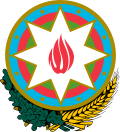|
Ministry of Foreign Affairs (Azerbaijan)
Ministry of Foreign Affairs of Azerbaijan (Azerbaijani: Azərbaycan Respublikasının Xarici İşlər Nazirliyi) is a Cabinet-level governmental agency of Azerbaijan Republic in charge of conducting and designing the country's foreign policy. The ministry was first established in 1918. In the Soviet era it largely lost its sovereign authority which was restored after Azerbaijan's independence in 1991. HistoryThe Ministry of Foreign Affairs of Azerbaijan was established in 1918, during the first Republic of Azerbaijan. In that period, Azerbaijan gained international recognition and built diplomatic relations with several countries. In 1918–1920 there were representatives in Armenia, Georgia, Turkey, Turkistan, with embassy and authorized representative offices. Azerbaijan also had an authorized representative office at Paris Peace Conference under the leadership of Alimardan Topchubashov.[1] After the Bolsheviks occupied Azerbaijan in April, 1920, the Ministry of Foreign Affairs was abolished and was replaced by Azerbaijan SSR People's Foreign Affairs Commissariat (PFAC). People's Foreign Affairs Commissariat, despite having the relevant authority, implemented certain bilateral relations in foreign countries in 1920-1922, including Turkey, where Azerbaijan SSR had its own ambassador, Ibrahim Abilov. People's Foreign Affairs Commissioners of Azerbaijan were Nariman Narimanov and Mirza Davud Huseynov. But upon incorporation of Azerbaijan SSR into Transcaucasian SFSR PFAC was abolished. Towards the end of World War II, in 1944, the Soviet government restored Azerbaijani PFAC. In 1946 PFAC was transformed into Ministry of Foreign Affairs (MFA). But MFA still lacked relevant authority inside the Soviet Union. The last Foreign Minister of Azerbaijan SSR was Huseynaga Sadigov who led MFA also during seven months of independent Azerbaijan Republic. After Azerbaijan gained its independence in 1991, MFA was transformed into a complex Cabinet-level agency, responsible for designing and conducting Azerbaijani foreign policy. MissionThe Ministry of Foreign Affairs is operated in accordance with the Azerbaijani constitution, legislation, regulations, decrees and the main missions are:[2]
Structure and organizationAs of 2020:
Diplomacy DayDay of the Diplomatic Service, also known as Diplomacy Day, is an official professional holiday in Azerbaijan. Since 2017, according to the Ilham Aliyev's order on the establishment of a professional holiday for employees of the diplomatic services of Azerbaijan, it is celebrated on July 9 each year.[4] Diplomatic AcademyAzerbaijan Diplomatic Academy (ADA) was launched in 2006 in order to prepare global leaders and politicians. In 2014, by the decree of president, it was transformed into university.[5] Azerbaijani representation abroadIn order to increase its diplomatic missions abroad, Azerbaijani government in the middle of 2000 launched the related strategy. In 2018 the Ministry of Foreign Affairs maintained the following missions abroad:[6]
The Ministry of Foreign Affairs also cooperates with a number of international and regional organizations. Close relations are maintained with Organization of Islamic Conference (OIC), United Nations (UN), European Union (EU), Commonwealth Independent States (CIS), GUAM, North Atlantic Treaty Organization (NATO), UNESCO, Council of Europe, TURKPA and the Cooperation Council of Turkic Speaking States.[8] List of ministersAzerbaijan Democratic Republic
Azerbaijan Soviet Socialist Republic
Republic of Azerbaijan
See also
References
External links
|
||||||||||||||||||||||||||||||||||||||||||||||||||||||||||
